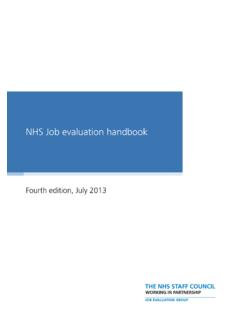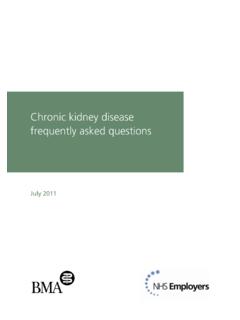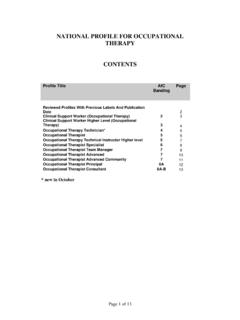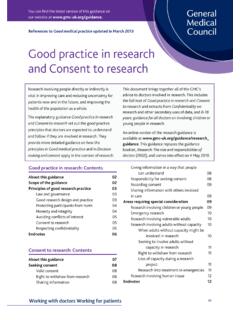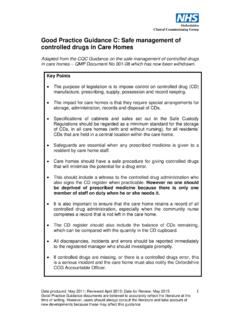Transcription of Equality, diversity and inclusion training A good practice ...
1 Equality, diversity and inclusion training A good practice guide Contents Introduction 3. Context 4. Who should receive this training ? 5. EDI training objectives 6. training content outline 7. What are health inequalities? 8. Legislative requirements and policies 9. Equality standards in the NHS 10. Understanding bias 13. Strategies for embedding equality diversity and inclusion 15. References and links 15. THE NHS STAFF COUNCIL: good practice equality, diversity and inclusion training guidance 2. Introduction This guide, produced by the NHS Staff Council Equality, diversity and This training should be an integral part of the organisation's wider inclusion Group, is aimed at equality, diversity and inclusion leads, cultural change and organisational development activities.
2 Planning and HR and learning and development professionals, and trade union monitoring of training delivery should be done in partnership representatives. with trade unions and staff networks, this can also support wider staff engagement. It provides a framework of good practice for the delivery of mandatory NHS equality, diversity and inclusion training for all staff, including key Local data considerations around: Using local data on staff and population demographics, plus any key frequency / timings Workforce Race Equality Standard and Workforce Disability Equality access Standard data and action plans, including how staff are involved, for considerations for different groups of staff (including line managers) example, through partnership working with trade unions and staff geography (for example, an understanding of the local health networks, may be a useful way of contextualising the training and economy, health inequalities and patient demographics) demonstrating a collaborative approach to change through engagement.
3 Engagement of other stakeholders related policies Alongside the training content outline we have included some tips and psychological support for staff. considerations on how to do this. The content set out in this guidance provides a basis of what may be included in NHS equality, diversity and inclusion (EDI) training . The delivery of training will vary based on local context. Consideration should also be given to the inclusivity of training content, ensuring it is relevant for all staff groups and pay bands so that staff are able to understand what equality, diversity and inclusion means for them. THE NHS STAFF COUNCIL: good practice equality, diversity and inclusion training guidance 3. Context The belonging in the NHS' section of the People Plan, outlines a range of actions for organisations to take to advance EDI.
4 One action is to The NHS must welcome all, with refresh EDI training so it is focused on actions and outcomes, in return it can have much greater impact. a culture of belonging and trust. The People Plan introduces health and wellbeing conversations' We must understand, encourage during which line managers will be expected to discuss the individual's health and wellbeing, flexible working and equality, diversity and and celebrate diversity in all its inclusion . The role of the line manager is pivotal to making the NHS. truly inclusive, particularly in the areas of recruitment and promotion forms. Discrimination, violence systems and processes, and also access to funded training and development opportunities. Equality, diversity and inclusion training and bullying have no place.
5 Should equip line managers with the necessary skills to recruit and develop staff equitably. If we do not role model this Since the implementation of the Equality Act (2010), publicly-funded culture, then how can our bodies have a duty to evidence how they are meeting the general and specific statutory duties. One way to do this, is to provide training for patients expect to be treated staff. equitably, and as individuals? . Other underpinning legislation such as the Human Rights Act (1998) The NHS People Plan which applies in healthcare settings, for example, Article 2 and the right to live and do not resuscitate decisions. Recent experiences of BAME staff of the COVID-19 pandemic and the disproportionate impact in terms of deaths.
6 THE NHS STAFF COUNCIL: good practice equality, diversity and inclusion training guidance 4. Who should receive this training ? The target audience for equality, diversity and inclusion training is all New and promoted staff (particularly those promoted to management staff employed by the organisation. roles) should complete relevant EDI training as a priority. All staff should complete refresher training annually. It is important to In addition, it is expected that, as organisational leaders, all non-executive remember that training is an important part of preventing bullying, directors (and governors in foundation trusts) will also receive training harassment and discrimination in the workplace and ensuring on their equality, diversity and inclusion obligations.
7 Some organisations employers meet their responsibilities under the Equality Act (2010). hold trust board seminars to review their annual progress against NHS Line managers should complete relevant EDI training and also in England's equality standard submissions and to review their strategy and undertaking fair and objective recruitment (as per section 31 of the plans accordingly. Agenda for Change Handbook) before sitting on any recruitment /. selection panel. All staff regardless of grade and substantive status should have access to this mandatory training . EDI training is also important to ensure line managers are able to carry out staff appraisals. Annex 23 (England only) of the Agenda for Employers should work with contractors, bank staff providers and Change handbook covers pay progression for new and promoted staff other employers which provide services for the trust to ensure an from 1 April 2019.
8 Pay progression is based on four nationally-agreed aligned approach in terms of training , recognising that their workers standards (five for line managers). The first wave of pay step reviews will interact with staff and service users in workplace and care settings. took place in April 20211 for new or promoted staff under the new It should take place in work time, and time to attend training should pay progression system so it is important to ensure line managers are be considered when planning work and rostering staff to ensure that equipped with the necessary skills to carry out these reviews fairly. all staff groups are able to attend. When staff are based on different Support for staff should be available as discussions around sites or in the community, ability to travel and time taken to travel to discrimination, bullying and harassment may be difficult for some training sites should also be included in planning.
9 Staff. It's important to acknowledge this, including creating safe spaces Particular attention should be given to virtual training with for staff, access to support from trade union representatives and consideration given to access and training to use technology, and paid staff networks. Relevant bullying, harassment and freedom to speak time to attend virtual training . Learning from the coronavirus up policies should be signposted with messages that NHS staff should pandemic should include consideration of training delivery - including feel able to raise concerns without fear of detriment, and those the best mix of virtual and face to face. concerns should be listened to. Links to psychological first aid training may also be useful.
10 1 The coronavirus pandemic has meant pay step reviews may not immediately take place, see relevant NHS Staff Council guidance THE NHS STAFF COUNCIL: good practice equality, diversity and inclusion training guidance 5. EDI training objectives participants are expected to: 1 Gain an understanding of equality, diversity and inclusion and impact on patients, staff and the community. 2 Gain knowledge of the founding principles of the NHS and its constitution. 3 Raise awareness of cultural competency in the workplace. 4 Gain knowledge of the nine protected characteristics covered by the Equality Act. 5 Understand the different types of discrimination. 6 Gain knowledge of health inequalities, its impact and how to start reducing and eliminating the causation.
